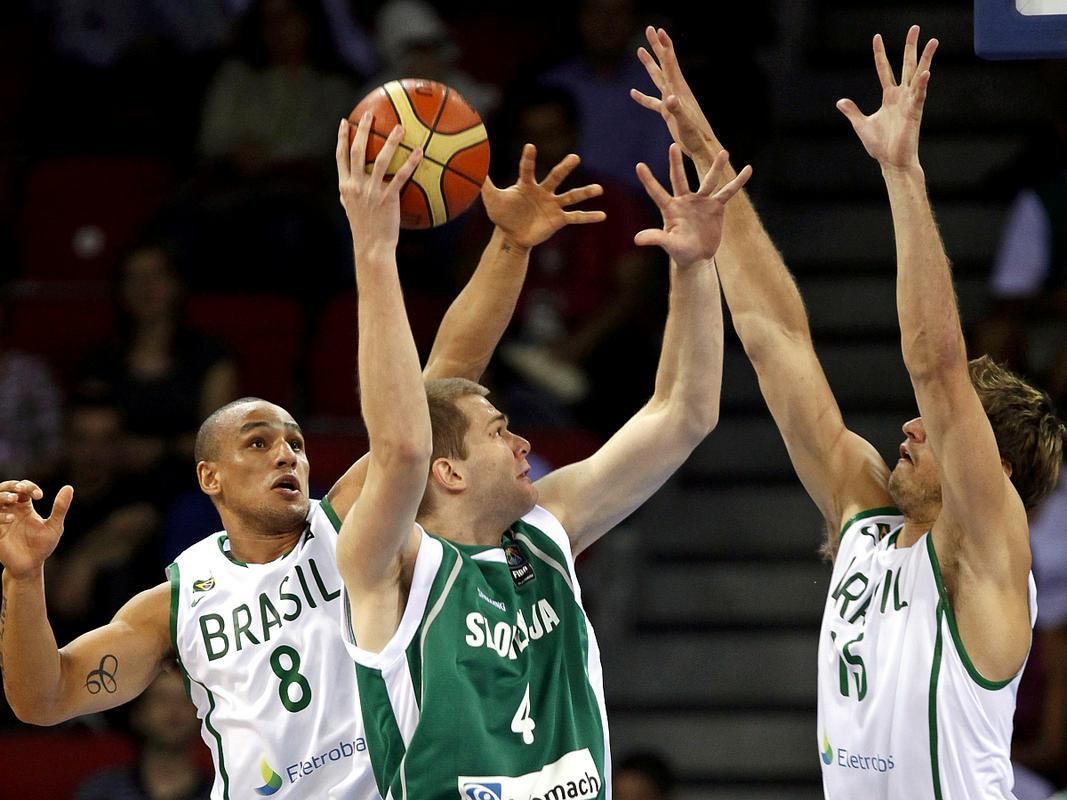
Slovenia won the second consecutive participation at the world championship by an excellent performance in Poland, where the Slovenian team placed fourth at the European Championship. In Japan 2006 they were eliminated in the eighth of the finals. In Istanbul Slovenia played in the group part, and then through the knock-out part of the competition entered quarterfinals, but then lost three consecutive matches, and finished in the eighth place.
"The structure of the team was different, as well as the leadership. Each selector has his own mentality, his way of leading the team, which he then adapts to different types of players, and different types of teams he plays against. The eighth place in the world is a great achievement. Not many people can boast of being the eighth in the world in anything... We managed that, and it meant a great step forward to all of us, both personally, and for the Slovenian basketball," were the first words Slokar said when the World Championship in Turkey was mentioned.
Slokar has not missed yet any of the actions of the national team, and this will be his third participation at the world championship.
Beno Udrih came to preparations, but left soon
"Some of the older players were present as well, Brezec, Lakovič, Nachbar, Sani... The logical consequence was a different approach to the game, which however won't happen this year." Memi Bečirović, who took over the leadership of the national team from Jure Zdovec, and gave the reins to Božidar Maljković after the championship, could count on several players from the older generation. Also in Turkey Slovenia didn't play with full force. Matjaž Smodiš was still recuperating from back surgery, the Lorbek brothers were injured, Saša Vujačić once again failed to join the team, while Beno Udrih did come to Rogla for preparations, but left before the first preliminary match, the reason being vaguely defined roles within the national team.
Slokar says that Beno's act had no influence on the chemistry within the team. "I try to forget such things as quickly as possible, as they actually don't influence the team, or the boys who wish to be here. It is more than obvious that we all want to have the best team, and the best individual players. Beno and I are very good friends, and it is not in my interest to explain what happened, as it was not my problem, and nothing I should dwell on. I removed myself from that problem."
Also this year we would like to reach a step higher
In the group part Slovenia won against Tunisia, Iran, the derby against Croatia, and also against Brazil after an exciting match. They lost only against the Americans, who later became the world champions, after waiting for 16 years. The eighth of the finals followed, and a great performance against Australia (87:58): "Of course I remember the match against Australia. It was the springboard we wished for, and by winning we improved the result achieved in Japan in 2006. This year we would like to improve the result we achieved in 2010. We all want to make a step forward."
The victory against the boomers placed the Slovenian team among the 16, but in the quarterfinals the obstacle they hit against was too high. The Turkish team was, besides the USA, the best on the court. They played excellent basketball, and had the support of the exceptional audience. They yielded only in the finals. "Turkey gave superior performances, with the great help by the audience, which carried them to the second place. It is a proof of the influence the audience has. We were well prepared, but they played better," remembers Slokar, who played with an injured leg, but gritted his teeth against the pain and helped his team.
The support by the fans reflects in results
Since Belgrade 2005 Slovenia has had great support of the fans. And since then it has been achieving great results, and has been placing among the best on the old continent. In Turkey Slovenia had the support of more than 4,000 fans at some of the matches, which is an exceptional number. This support largely contributes to the success the Slovenian national team has achieved lately. "It is rather simple, the results speak for themselves. Years ago, let's say until 2003, when the national team lacked the support from the audience, no good results were achieved. Since the support has started growing, the results are good."
Tilen Jamnik
Translated by G. K.

































































